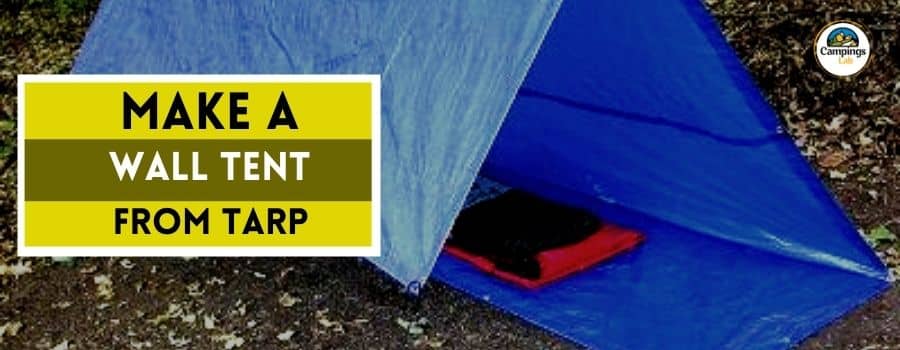2020 has been rough on all of us, what with being quarantined and maintaining lockdown regulations. If you are like me and tired of being cooped up, camping outdoors is a great way to maintain social distance while enjoying nature. But how to insulate a tent for winter camping?
Other questions like, is thermal clothing really necessary? Isn’t a tent heater a must to camp during the cold? All these questions must be swimming in your mind.
When I first started camping as a hobby, I kept buying useless things like log holders instead of objects such as reflective foams. It was an utter disaster in the first few outings. But now, I learned from my mistakes just how vital a well-insulated tent is.
Here are the ways you can keep yourself and your tent warm during this winter!

Page Contents
Make A Checklist Specifically For Insulation
Making a checklist is the most crucial step. Trust me; you do not want to arrive at the camping zone and realizing that you forgot clamps. In addition to your usual camping gear, make a detailed list of the things you need to insulate your tent.
Some essential equipment like:
- Thermal blankets
- Clamps
- Air mattress
- Reflective foams
- Insulated sleeping bag
- Thermal underwear
- Heat packs
- Windbreakers/ Tarps
- Extra woolen / synthetic clothes
- Thick hat
- Thermal water bottle
Besides, you need to keep an eye on the quality and type of gear you are bringing. For winter camping, the tent must be a four-season tent. A two-season tent will not keep the wind out.
Also, make sure the tent is smaller than a summer tent. The roomier the tent is, the more space you need to keep warm. Take rain fly tarps if the weather reports say there is a chance of rain.
Steps: How To Insulate A Tent For Winter Camping?
1. Insulation
Before you move on to know how to insulate a tent for winter camping, you need to know what insulation means. It is a barrier of sorts that prevents/ reduces heat transfer from one source to another. Arctic mammals have a natural insulation method that keeps them warm.
This concept can be used in two ways when you insulate your tent. You can keep the heat (or warm air) inside and prevent the cold air from getting inside the tent.
2. First Step
After you pitch your tent, the first step should be ensuring you stacked the tent well. Then, insulate the rooftop and the walls from inside with thermal blankets or reflective foams. Make sure the reflective foam has reflective aluminum on both sides.
It is necessary to insulate the walls/ rooftop and not just the floor. Since cold air can penetrate through them too. If they aren’t appropriately layered, use clamps to hold the blankets together.
Not correctly insulating your rooftop will lead to the warm air escaping because air rises when it’s warm. And let chilly air take its place.
3. Insulating Tent Floor
Now, you can start insulating the floor. Use a heating carpet, dry branches, dead leaves, thermal blankets, ground mats, large towels, etc. Covering the camp footprint will create a layer of protection between you and the ground.
The surface of the earth gets progressively colder as the night goes by. That’s why you need to ensure that every inch of the floor is covered. This precaution will help retain heat.
Also, make sure the blankets are placed so that they cover the inside tent perimeter. And the blankets should go up 4-5 inches against the wall. It will prevent the wind from getting inside through the edge of the tent.
4. Placement Of Bed
Your bed should not be a raised one. If you use a raised bed, then cold air will seep into the pockets of space between you and the ground. Place a sleeping pad or an air mattress on top of the blanket.
The air mattress will create a barricade to trap the cold air. Then, put your sleeping bag on top of them and another blanket on top of your sleeping bag. Put some heat packs and a water bottle inside your sleeping bag.
5. Heater And Clothes
Some people enjoy tents with ac during summer camping, but it is a luxury. On the other hand, no one can deny the usefulness of a heater. If you can guarantee that your tent won’t catch on fire, you should use a tent heater.
In addition to that, wear multiple layers of clothes and keep your boots/ socks inside your sleeping bag. Thermal underwear is a must to remain warm.
6. Outside Preparation
A proper campsite minimizes half the risk that comes with winter camping. It would be best if you considered the weather when picking a campsite. Suppose it’s windy, camp near a cave, boulders, trees, or between shrubs to provide a windbreak.
Windbreaker will stop gusts from making direct contact with your tent and leaching warmth from it. Similarly, you can tie a tarp between trees to reduce the flow of cold air. If you do not have windbreakers or tarps, you can use dry dead leaves and cover the tent from the outside.
A campfire can warm the area around your tent. However, make sure it isn’t near your tent.
Winter camping can be enjoyable if you know how to insulate a tent for winter camping. A properly insulated tent guarantees a good night’s sleep and can make your whole camping experience extremely comfortable. Reading about protecting a tent might make insulation seem a little complicated, but it will feel straightforward to you after the first few times.
And if you become a fan of winter camping, it will slowly become a habit! Remember, once you are out in the wild, the only provisions you will have are the only ones you carried there. Besides, if your tent is not well insulated, you might even get frostbite or hypothermia.
Finally, it is advisable not to go camping if the temperature is below zero degrees Celsius.





Leave a Reply